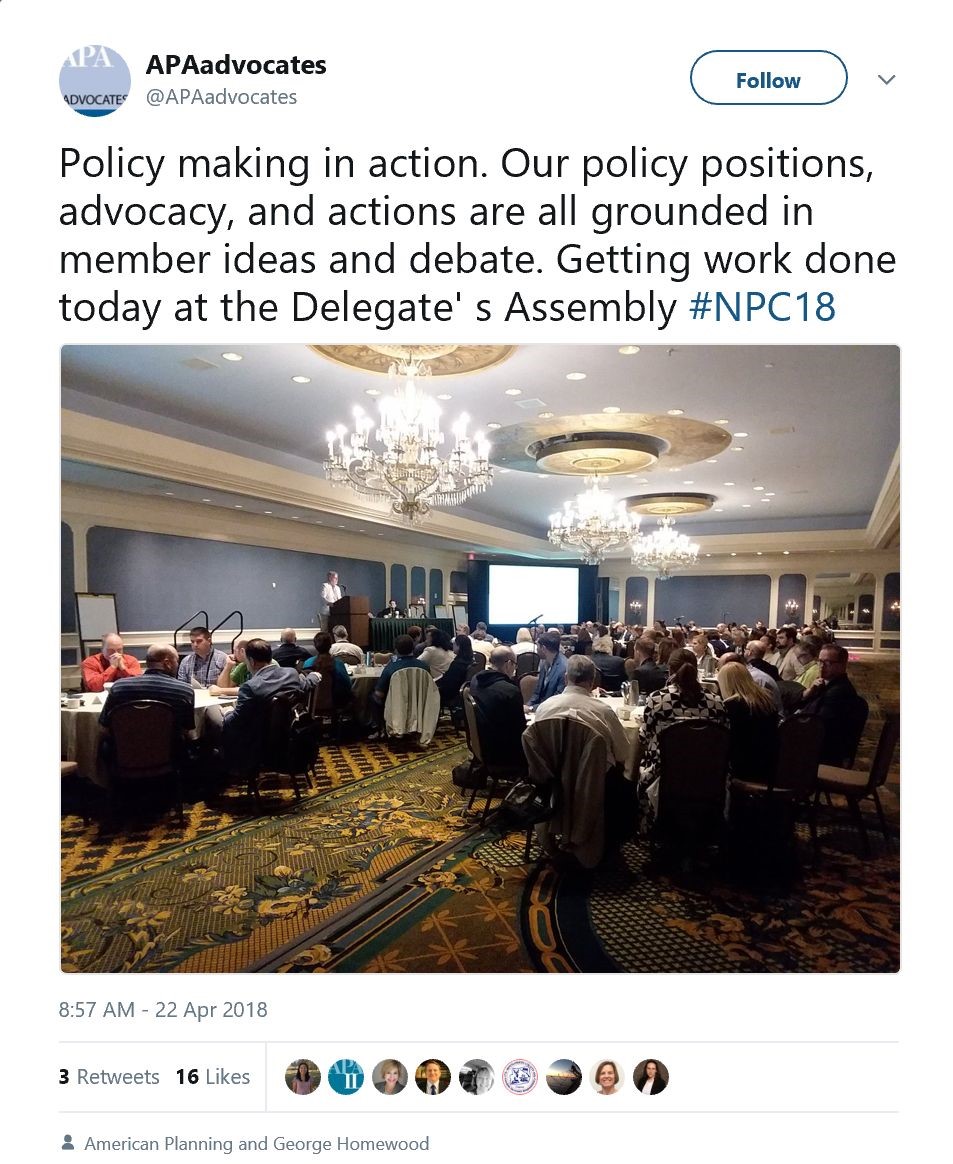- About Us
- Events & Training
- Professional Development
- Sponsorship
- Get Involved
- Resources
National Conference and Delegate Assembly Report-outBy: Yorik Stevens-Wajda and Esther Larsen, Legislative Committee Co-Chairs The Washington Chapter was well represented at the APA National Conference in New Orleans this April, as evidenced by a lively chapter social reception that was a high-density zone of engaging conversation, delicious food, old friends and colleagues, and new faces (thanks Nancy Eklund for organizing!). The conference was inspiring, educational, interesting, fun, and made the most of an incredible city so rich in history, architecture, music, and culture. Each year’s national planning conference includes a gathering of delegates from each state chapter tasked with discussing, debating, and approving new APA Policy Guides. This year’s delegate assembly covered early work on three important and difficult topics: housing, equity, and transportation. The chapter’s delegates, Reid Shockey and Yorik Stevens-Wajda, contributed examples from what has worked well in our state, innovative solutions we’ve seen, and other suggestions for crafting APA’s policy guides. Policy guides provide APA’s positions on matters of principle to inform planning advocates and offer best practices for practicing planners to use in their work. While traditionally internally focused on planners themselves, APA is working to pivot future guides to be actionable through their style and by taking ideas from the guides to decision-makers themselves.
The second policy guide discussed was transportation, which is also an update of an existing guide. This update will incorporate new federal legislation such as MAP-21 and the FAST Act, APA policy principles on infrastructure and autonomous vehicles, and will reflect the recently adopted freight mobility policy guide. Key topics will include: specific transportation needs for rural, suburban, and exurban areas; using data – including ‘big data’ – for equitable and effective decision-making; the future of public transportation; changing transportation revenue options (e.g. declining utility of the gas tax); streamlining project analysis; and ensuring that projects efficiently address our shared goals. The third policy guide delved into social equity and inclusion – a topic of major recent focus for APA. Delegates broke into small moderated groups for in-depth discussions on issues including community engagement and empowerment, diversity, gentrification and displacement, and environmental justice. Delegates discussed ways to help APA members and planners better reflect the demographics of the communities they work for and be more aware and responsive to diverse cultures as well as how to reconcile competing goals like the revitalization of distressed communities vs. displacement of long-time or vulnerable residents and businesses. Over the summer the equity guide working group will incorporate feedback received from the delegate assembly and through several sessions and discussions at the conference and then will seek approval of a final draft at this fall’s Policy & Advocacy Conference in Washington, D.C. Finally, both the Delegate Assembly and attendees of a subsequent legislative liaison meet and greet shared ideas and best practices regarding state-level advocacy efforts. Suggestions included hosting town halls and legislative breakfasts to highlight issues and learn about legislators’ priorities, holding a planners’ day at the state capitol, and candidate forums during election season to increase the visibility of planning issues in campaigns. Michael Piscitelli, AICP, Connecticut chapter president, suggested this talking point: you will hear different things from many different advocates on these issues – APA can use its expertise, consensus-building skills, and more neutral position, to help sort through them. There are several ways to get more information about or get involved in, these three policy guides and APA’s other policy and advocacy efforts. Check out the APA Policy and Advocacy and WA-APA Legislative Committee websites, join the chapter’s legislative committee to engage on state issues, join the Planner’s Advocacy Network to engage on national issues, or email [email protected] to be connected to one of the policy guide working groups. Legislative committee meeting June 22 in OlympiaThe legislative committee will have an in-person meeting in Olympia on Friday, June 22, 2018, from 10 am until 12 noon before the chapter Board of Directors’ summer meeting that is scheduled from 1 pm until 4 pm. The location for both meetings is Tumwater Town Center. We will review the 2018 session; work on developing the chapter’s 2019 legislative agenda, discuss potential legislation needing a response during the interim; hear from chapter lobbyist Michael Shaw regarding predictions and pending items for the 2019 session including items that are relevant for our legislative agenda and priorities; and share successes, challenges, and suggestions for participation by committee members during the 2019 Session. Driving directions: https://www.doh.wa.gov/AboutUs/BusinessHoursandLocations/TumwaterTownCenter |

 The first policy guide taken up by the delegate assembly was housing, which was last adopted in 2006 with an emphasis on housing condition, location, diversity, and cost. This update will incorporate the recently-adopted housing policy principles, and new issues: fallout from the 2008 housing crisis, sustainability, resiliency and climate change, changes in federal policy and funding (e.g. the tax law), and impacts of legal decisions (e.g. the Supreme Court’s influential
The first policy guide taken up by the delegate assembly was housing, which was last adopted in 2006 with an emphasis on housing condition, location, diversity, and cost. This update will incorporate the recently-adopted housing policy principles, and new issues: fallout from the 2008 housing crisis, sustainability, resiliency and climate change, changes in federal policy and funding (e.g. the tax law), and impacts of legal decisions (e.g. the Supreme Court’s influential 